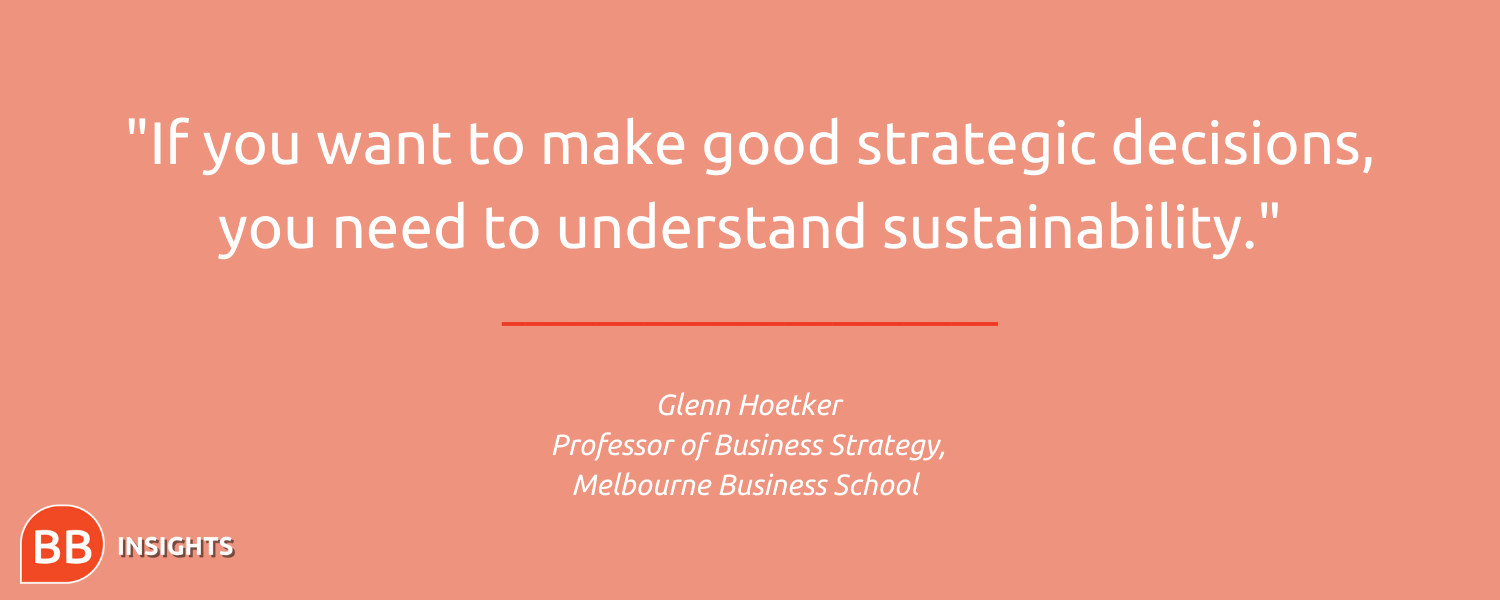Sustainability is increasingly a priority area for businesses. Factoring in environmental and social issues helps companies have a more positive impact on the world around them—but it can also improve their bottom line.
According to a McKinsey report, sustainable companies are more profitable than their less sustainable counterparts, performing above the market average over three to five years.
In this landscape, having a good understanding of sustainable management will be crucial for future business leaders.
Long-term success
What is sustainable management? Sustainable management means factoring environmental issues when making decisions and developing strategy. This typically means considering the long-term impact of an organization rather than simply short-term profits.
“I like the definition of sustainability as addressing today’s needs without diminishing the ability of future generations to fulfill theirs,” reflects Glenn Hoetker, professor of business strategy at Melbourne Business School (MBS).
This definition stems from the influential ‘Our Common Future’ report, produced by the UN in 1987, which addresses the realities of living on a planet with finite resources.
Glenn is also director of the school’s Centre for Sustainability and Business, which brings together faculty, students, and members of the business community to conduct research and teaching on sustainability issues.
Managing an organization sustainably not only benefits the environment and local community in the long-term. It also brings benefits like increased staff morale, greater profitability, and improved recruitment.
The Governance and Accountability Institute, a think tank that develops sustainability best practices, found that as many as 40% of Millennials have chosen a job because of the company’s good sustainability performance – and this fits within broader trends towards more purposeful work and naturised workplaces.

Pleasing stakeholders
According to Pew research, 64% of US adults think protecting the environment should be a priority for governments—a 32% increase since 2008. As public attitudes toward climate change shift, businesses are reassessing their priorities.
To appeal to their stakeholders—including customers, suppliers, employees, and regulators—organizations must incorporate sustainability considerations.
“If you wind back five to eight years, you could go into a lot of companies that didn’t understand why sustainability was relevant to them,” says Glenn.
“But now, this is what stakeholders care about. If you want to make good strategic decisions, you have to understand it.”
Investors, too, are increasingly interested in a company’s sustainability efforts—and many organizations are acting to keep up with this interest. Listed companies are increasingly running ESG (environmental, social, and governance) roadshows alongside more traditional financial results shows.
One example is the major steel manufacturer, Bluescope, which has been experiencing greater interest in its ESG event and engagement.
“That’s a sign of how quickly things have changed,” Glenn comments.
Recognizing the importance of sustainable management to stakeholders, MBS has worked to incorporate sustainability teaching into the MBA at MBS.
The school is launching a new elective in Managing Sustainability for Strategic advantage, which will cover how sustainability is incorporated into strategic decision-making.
One key learning opportunity will be bringing in speakers who work on sustainability strategies within their organization.
“We’ll be bringing in folks from a wide range of industries and government agencies—and not just sustainability leaders,” Glenn explains.
“It’s equally important that students hear from people working in industries that are really struggling with this transition.”
As well as hearing from speakers, students will learn the fundamentals of topics like the circular economy and the science of climate change.
Sustainable management challenges
Despite the growing enthusiasm among businesses for addressing environmental and social issues, there are still some major challenges for leaders who want to practice sustainable management.
With so many goals to consider, one of the most significant hurdles is knowing where to start.
“Many [organizations] have really ambitious goals, but the challenge is deciding what to do, and where to invest, first,” Glenn explains.
Organizations like these are looking for future leaders who can translate this ambition into concrete plans that mesh with other business goals.
This means that having an awareness of sustainable business can also be a key differentiator when it comes to developing your career post-MBA, Glenn notes. For this reason, the school is working to incorporate sustainability issues and best practices widely in its curriculum.
“Many of our professors are interested in addressing relevant ESG issues through the context of their classes, and we’re looking to support faculty who want to do more of that,” he says.
As ESG becomes an ever more pressing priority for companies, sustainable management is likely to become the default practice.
“Today, I think there are very few companies that don’t think sustainability matters to their performance,” Glenn concludes.
BB Insights explores the latest research and trends from the business school classroom, drawing on the expertise of world-leading professors to inspire and inform current and future leaders
RECAPTHA :
73
72
db
0a








